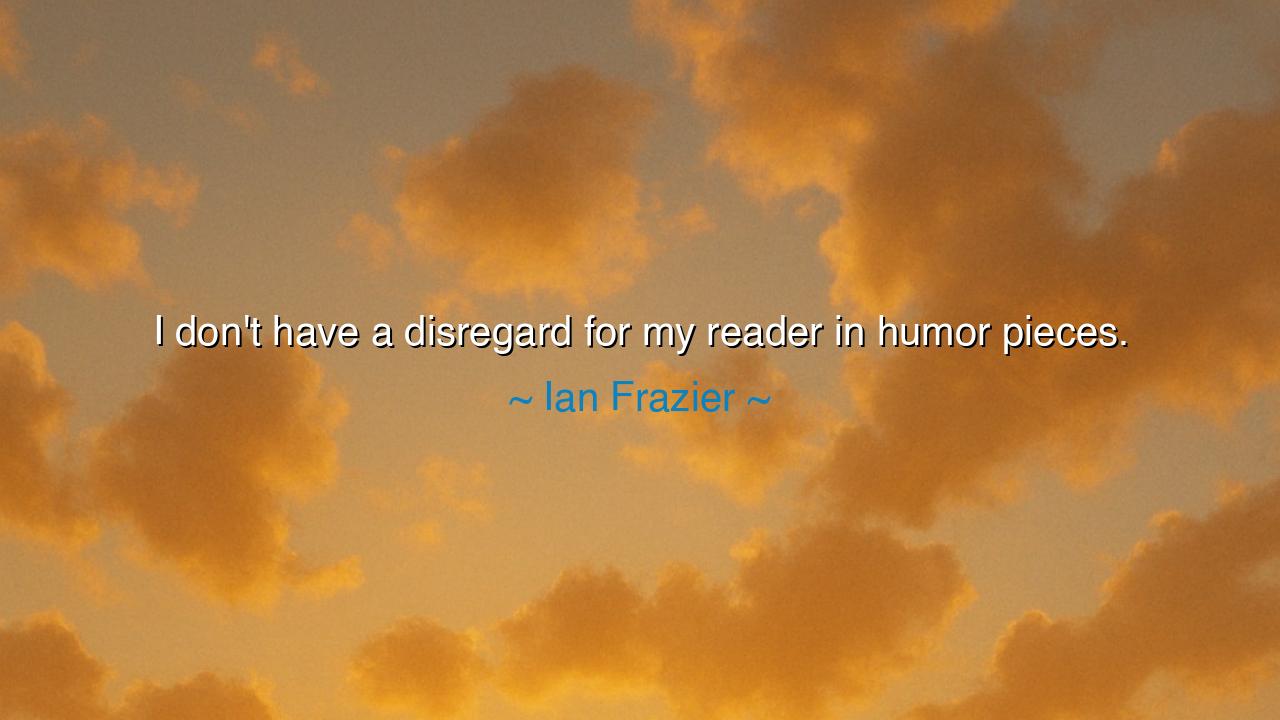
I don't have a disregard for my reader in humor pieces.






Hear the words of Ian Frazier, the keen observer of life and master of gentle laughter: “I don’t have a disregard for my reader in humor pieces.” These few words, though modest in tone, carry the weight of great wisdom. They speak not only of art, but of respect—for humor, at its highest form, is not cruelty masked as cleverness, nor mockery disguised as wit. It is communion. It is the meeting of two minds—the writer and the reader—across the bridge of laughter. In these words, Frazier declares a sacred principle: that the humorist must love those who read his work, not humiliate them. His laughter must be shared, not inflicted.
The ancients would have understood this truth well. In the agora of Athens, Aristophanes, the father of comedy, made the people laugh not to degrade them, but to awaken them. His humor exposed the folly of leaders and the vanity of the wise, but it also reminded citizens that laughter could cleanse the soul. The wise laugh not to wound, but to heal; not to divide, but to unite. So too does Frazier follow in this lineage. He writes not from arrogance, but from empathy. To have no disregard for the reader is to see the reader as an equal—a companion in the journey of thought and feeling, one who laughs not at others, but with them.
In our age, laughter has often lost this gentleness. Many wield it as a blade, not as a balm. The comedian mocks the weak to gain applause from the strong; the writer sneers at his audience, mistaking cynicism for intellect. But true humor—the kind that endures through centuries—springs from love, not contempt. Ian Frazier’s humor carries this purity. He does not stand above his audience, but among them, pointing out the absurdities of the world with a smile rather than a sneer. His words remind us that laughter, when offered in kindness, can reveal truth more deeply than sermons or speeches ever could.
There is a tale of Abraham Lincoln, a man known as much for his humor as for his wisdom. During the darkest days of the Civil War, when his cabinet was burdened by grief and exhaustion, Lincoln would often tell stories—sometimes foolish, sometimes tender, always human. His laughter was not an escape from sorrow, but a bridge across it. A general once criticized him, saying, “You ought not joke while men die in battle.” Lincoln replied, “If I could not laugh, I should die.” His humor did not disregard his listeners—it comforted them. He knew that to share laughter was to remind weary souls of their shared humanity. In this, Lincoln and Frazier walk the same path: both understand that humor, when guided by compassion, becomes a light in the world’s darkness.
The origin of Frazier’s sentiment arises from the deep tradition of literary humor—the humor that observes, rather than mocks; that includes, rather than excludes. From Cervantes to Twain, the great humorists of history have written with love for their audience, not disdain. They have known that to make a reader laugh sincerely is to enter the most intimate chamber of the human heart. The writer who treats this gift lightly, or with disregard, profanes it. But the one who honors it, as Frazier does, becomes a friend to his reader—a companion who reminds them that even amid the trials of existence, joy can still be found.
The lesson here is one of reverence. Whether you write, speak, or live among others, never use your intelligence or wit to belittle those who listen. Laughter built on cruelty is a flame that burns both giver and receiver. But laughter born of understanding warms the world. To practice humor rightly, you must first cultivate empathy. Observe others not as targets, but as fellow travelers. Speak not to dazzle, but to connect. When you make others laugh, let it be because you have shared their burdens, not mocked them.
So, my listener, let the teaching of Ian Frazier guide you: never disregard the hearts of those who hear you. When you speak or write with humor, do so as one who offers bread, not stones. Be watchful of your words, for laughter can build or destroy. Strive for laughter that uplifts, that reminds men of their shared frailty and their common hope. In doing so, you will find that humor becomes something greater than jest—it becomes an act of love, a sacred exchange between souls. For the greatest writers, and the wisest hearts, have always known: to make another laugh without wounding them is not only art—it is grace.






AAdministratorAdministrator
Welcome, honored guests. Please leave a comment, we will respond soon